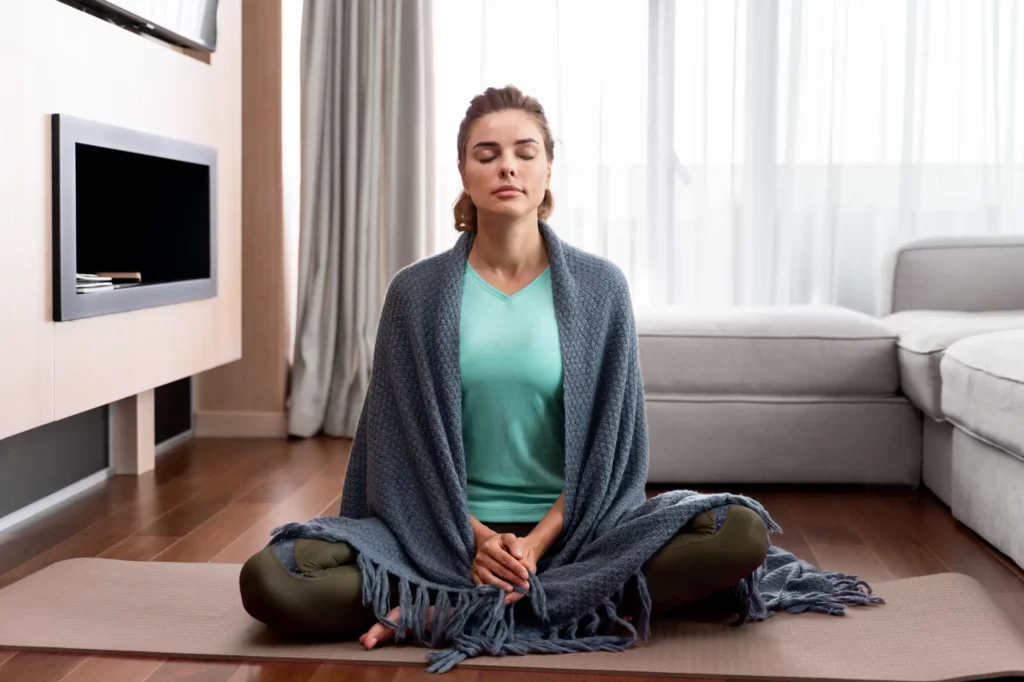Meditating at home is a good way to find the peace that’s right under your own roof. It’s kind of like giving your mind and body a break, a special time-out from the hustle of daily life simply to relax. You don’t need anything fancy to practice meditation at home—just a place where you can sit or lie alone without any unnecessary distractions. If you want to learn how to do meditation at home keep reading.
To start meditating at home, find a quiet place where you feel at ease. It might well be as simple as curling up on the sofa in your living room corner, floor cushions pushed up against each other, or even a comfy armchair. Just be sure that the space is quiet and not bothered by external disturbances such as loud noise from outside, or too much brightness from lights. Once you have found your place, sit or lie down comfortably and close your eyes. Take a deep breath through the nose, then slowly out through the mouth. Do this several times to help relax your body and mind. This is the best answer to how to control overthinking mind after doing meditation at home.

Now you can choose a center for your meditation. Some people prefer to concentrate on their breathing, feeling the rise and fall of their chests or the passage of air through their nostrils as it enters and leaves their bodies. Others like to repeat mentally a soothing word or phrase such as “peace,” or “calm.” The best way to learn how to meditate at home is to watch videos online if you are having a problem doing it by yourself.
What is Meditation?
Meditation is a practice in which a person sits quietly and focuses his or her mind on something specific, like breath, word, or image. It is a way to relax and unwind after getting rid of worrying thoughts or feelings.If you’re seated you sit up straight with your eyes closed and start to take deep breaths slowly. The goal is to learn how to stop overthinking at night and follow your breath and allow other thoughts that come into your mind at the same time to lapse into space.
Meditation has been practiced for thousands of years across many cultures and religions worldwide. People meditate for different reasons such as stress reduction, enhancing focus, and promoting emotional well-being. Research indicates when you learn how to do meditation at home it can benefit both mind and body in numerous ways. It can lower stress levels, increase concentration and attention, and generate feelings of peace and happiness.

There are many types of meditation.
- These include mindfulness meditation, in which you focus on the present moment, and loving-kindness meditation, for generating feelings of goodwill towards yourself and others in addition to cultivating compassion.
- In short, meditation is a simple practice available for all. It does not require special equipment or skills, just a willingness to sit quietly and be mindful of your breathing, or another place where you’ve chosen to keep your attention. If you aim is to learn how to control overthinking mind, meditation at home is the best option for you to achieve that.
What Are The Benefits Of Mediation?
When we meditate at home, there are many ways in which it makes us feel better. Let’s discuss some benefits of meditation.
- First, it calms our minds. You know how sometimes you are worried or disturbed and your thoughts are all over the place? Meditation slows down our minds and lets them take a break from all that anxiety. A lot of people wonder how to meditate at home, the answer is very simple. You just sit down and take a deep breath.
- Next, during meditation, we start to feel happier and less stressed. You know that good feeling when you are playing with a favorite toy or hanging out with your best friend, and everything looks so bright?
- Well, meditation also gives us that warm sensation even if things aren’t going well. It’s like a loving embrace for our hearts. When learn how to reduce stress and overthinking by meditating at home, your body releases endorphins that make it feel good on the inside.
- Finally, meditation enables us to be kinder to ourselves and others. Do you know how sometimes we feel irritable or angry at somebody? Meditation helps us to realize what that’s all about. It’s like putting yourself in another person’s shoes and seeing things from his perspective. When we meditate, we become faster, more patient, and gentle even when things go wrong. It’s like sowing the seeds of love into our hearts and watching them grow. If you want to know how to stop overthinking at night then you should give meditation at home a try.

In short, meditation is more or less the superhero of our minds and bodies. It helps us feel quiet, satisfied, and kind to ourselves as well as to others. And the best part? Anyone can do it, anytime, anywhere! All you need is a few minutes and a quiet place where you can sit down alone and breathe softly for a while.
How To Do Meditation At Home?
Meditating at home has several benefits for your overall well-being. It can help learn how to reduce stress and overthinking, improve concentration, and focus on areas of interest other than yourself. And finally, it’s an easy practice that’s available to just about everyone whenever they wish. So why not give it a try and see how much better it makes you feel?
Tip 1 – Find a quiet and comfortable place –
“Doing” meditation at home means that you need to find someplace quiet where no one else will interfere. First, find a quiet and comfortable place where you won’t be disturbed. Like in the cozy corner of your room or perhaps out in the garden. Make tea for yourself then sit or lie down comfortably in some quiet place and shut your eyes gently, as if practicing sleep lying on your right side.
Tip 2 – Now concentrate your mind on your breath. –
Feel the air that has entered and left this world through your nostrils or mouth. You might have noticed how when breathing in it is cool and it is warm when you exhale. If your mind begins to wander, bring it back gently. If your goal was to learn how to meditate at home this is the best way. This is exactly you can learn how to control overthinking mind. Take a few moments to calm yourself and check that every part of the body has been brought into stillness and peace.

Bonus Tip For You –
Keep on doing this for a few minutes, perhaps five to ten to begin with. If it feels a little strange or hard to concentrate at first, that’s perfectly all right. Just know that wears off with practice. When you’re finished, open your eyes slowly and take a moment to stretch. And that is how to reduce stress and overthinking with meditation at home.
How Does Meditation Affect Your Mental Health?
Meditation is a way to train our minds to be calmer and more focused. When we practice meditation regularly we learn how to stop overthinking at night. It can also have many positive effects on your mental health. Here’s how:
Reduces Stress:
Meditation helps to relax our minds and bodies. When we meditate, we focus on our breath or a peaceful thought, which can calm our nervous system and reduce the levels of stress hormones in our bodies.

Improves Emotional Well-being:
Regular meditation at home can help us become more aware of our thoughts and feelings without getting caught up in them. This awareness allows us to respond to situations with greater clarity and less emotional reactivity, leading to improved emotional well-being.
Enhances Concentration:
Meditation strengthens our ability to concentrate and stay focused. By training our minds to pay attention to the present moment, we become better at ignoring distractions and staying on task, which can improve our productivity and performance in daily activities.
Promotes Better Sleep:
Many people find that meditation helps them sleep better at night. By calming the mind and reducing stress, meditation can create a more conducive environment for restful sleep, leading to improved overall mental health.

Boosts Positive Mood:
Studies have shown that regular meditation practice can increase levels of positive emotions like happiness, gratitude, and compassion. By cultivating a positive outlook on life, meditation contributes to greater overall mental well-being.
Meditation has several beneficial effects on mental health, including reducing stress, improving emotional well-being, enhancing concentration, promoting better sleep, and boosting positive mood. Learning how to do meditation at home and making it a part of your daily routine can be a valuable tool for maintaining and improving mental health.
Mediation also helps you introspect and identify a lot of issues in your relationship. Sometimes these issues can only be resolved with the help of relationship counseling. So if you feel like your relationship is heading down that path it is very important to get the help that you need.
Conclusion:
It is safe to say that meditation is a friend to our minds. We feel better and stronger whenever we spend time meditating. It is like taking a break from all the stress and concern about daily struggles. It is an excellent practice for feeling more relaxed, happier and having a clear mind all the time. Just like we take care of our body through physical exercise and eating well, we should also take care of our brain through meditation. If you are wondering the best way to make your life better you should learn how to do meditation at home.
It may seem simple, but meditation is a powerful tool that helps improve our mental health and general well-being. Therefore, every minute spent in meditation is an investment in our mental health! Let’s meditate and enjoy the fruits of meditation! A peaceful and calm mind will be the basis of making us more joyful, healthier, and happier people which will eventually come from doing meditation at home.
FAQ’s:
What Are Some Basic Meditation Techniques For Beginners?
If you are a beginner, you may try sitting and focusing on the sensation in your nostrils when breathing. For instance, you might simply repeat the word “Aum” or “Om,” which is seen by some as a divine sound itself. Or in contrast from focusing on sounds outside, find out where there are sensations within your body and sweep through them slowly. As you become comfortable with these techniques try longer meditation periods.
How Long Should You Meditate For Each Session?
Begin with brief meditation sessions, say 5-10 minutes. As you become more comfortable, you can increase your sessions to 15-30 minutes. Pay attention to how your body feels and adjust the length accordingly. It is important to remember that it doesn’t matter if you start small and then build on it gradually.
Can Meditation Help With Stress And Anxiety At Home?
Yes, meditation can help reduce stress and anxiety by promoting relaxation and calming the mind. Regular practice can teach you how to manage stressful situations more effectively and cultivate a sense of inner peace and resilience.
What Time Of Day Is Best For Home Meditation?
The best time to meditate at home varies from one person to another. Some people prefer mornings, to start the day with clarity and focus; others find evenings more useful for unwinding. Try different times and see what works best for you, given your schedule that day as well as over the long term.
How Can You Maintain Focus While Meditating At Home?
Maintain focus while meditating at home by establishing a quiet, comfortable space that is free from distractions. To avoid clock-watching, use a timer and gently return your mind to its chosen meditation focus whenever it wanders. Give your
People Read Also :-
How To Control Anger In A Relationship?
How To Get Out From Toxic Relationship ?
How to heal from a breakup




